Peter MALONE
Pefect Dinner, The
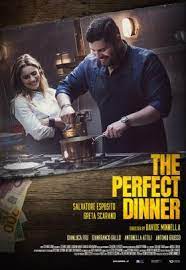
THE PERFECT DINNER
Italy, 2022, 104 minutes, Colour.
Salvatore Esposito, Greta Scarano, Gianluca Colucci, Gianfranco Gallo, Marlon Joubert.
Directed by Davide Minnella.
This is a surprisingly engaging film – on paper, the story of chefs and restaurants as well as Neapolitan Camorra, violent murders and money-laundering, does not seem immediately attractive. But, that is what the film is about, serious in the implications about Camorra violence, light in the sequences in the kitchen, recipes, cooking, experiments, and the satisfaction of the restaurant patrons.
At the centre of the film is Carmine, genially played by Salvatore Esposito, brought up by his grandmother in Naples but under the patronage of Pasquale, the Camorra chief with his henchmen-thugs. Carmine can cook pizzas and remember some of his grandmother’s recipes. But, he is asked to pursue a friend who is in debt to Pasquale but cannot bring himself to do it. He is banished to Rome to look after a restaurant which is a rendezvous for Camorra ill gotten cash to be laundered. The Camorra theme continues with visits from some thugs bringing the money to Rome, especially violent threats from a violent subordinate of Pasquale, friend whom Carmine did not betray coming to seek his help to rescue a woman from Naples, Carmine going, promised money but the rescue attempt failing.
In the meantime, Carmine has encountered a young woman, Consuelo, originally from Argentina, a wandering life, ambitious as a chef, setting up her restaurant but heavily criticised by newspaper critics and having to close down. Carmine encounters her working as a cook in a restaurant, tastes her food, makes a proposal that she come to his restaurant (which is her old restaurant from which she was fired). She is a fiery character, suspicious of Carmine, confesses that the critics said her recipes lacked soul but she makes a nostalgia dish from her past which is immediately successful. So, a lot of time is spent in the kitchen, focusing on food, blending, preparations, cooking, presentation, all that fans of food films enjoy.
On the personal level, there is bonding between the two – but, threatened, because Carmine has been using the laundered money to finance the rebuilding and decoration of the restaurant and does not want to deal with Pasquale’s demands. Interesting complication when the friend he let go asks him to travel to Naples and Carmine has the possibility of €60,000 to cover the debt. Nicely, despite the failure of the enterprise, Carmine does receive the money, able to pay Pasquale. However, Pasquale realises what has happened, says he is coming for a meal, Carmine expecting the worst, closes the restaurant, Consuelo leaving in anger but later returning when she hears that Emile is being prepared, Pasquale given the full treatment and his enjoying the dishes despite his angry thug wanting to shoot Carmine.
The ending is not quite as we would imagine, violence yes, police, yes, but witness protection from Carmine and his having to leave Rome and Consuelo.
A nicely judged epilogue brings it all happily together. Much more enjoyable than might have been anticipated.
1. The title? Many dinners, menus, recipes, cooking, tasting, clientele?
2. Neapolitan settings, homes, the Camorra, pizza shop, the streets…? The room settings, the city, the restaurant, interiors, the kitchen, the restaurant for ships? The musical score?
3. Carmine and his story, family background, grandmother, Pasquale caring for him, loyalty? Cooking the pizzas? One of Pasquale’s gangster soldiers, the order, to follow Giuliano, Carmine eating, seeing Giuliano, the pursuit, Giuliano and his plea, letting him go? Pasquale lenient? Sending him to Rome, the restaurant, money-laundering? Carmine is a sympathetic character?
4. The background of the Camorra, gangs, power, laundering money, drug dealing, violence and murders?
5. Carmine in Rome, Rosario as his assistant, the restaurant, the clientele, the mobsters coming from Naples to deliver the money, supervise, Vincenzo and his ruthlessness? Raffaele and his having the meals?
6. Constable a low, her story, Argentina, parents, on the road, travelling, cooking, recipes? Her attempt at a restaurant, the critics, failure? Her working in the kitchen? Carmine, the visit, the taste, the meetings with Consuelo, the bonding, inviting her to his restaurant, her cooking, the nostalgia recipe? Her strong personality, commands, the renovation of the restaurant, our mind taking the money from the safe? The risks?
7. The renovations, the opening of the restaurant, Consuelo and her work, the staff, the achievements, the testing of recipes and taste? Memories of the critic? His turning up, Consuelo anxious, the favourable response?
8. Giuliano arriving, wanting Carmine’s help, his cousin being murdered by Pasquale, the issue of money, Carmine to go to Naples to rescue Margarita, €60,000, his visit, the trap, his escape?
9. Pasquale, Carmine ringing Giuliano’s phone, Pasquale phoning Carmine, the invitation to the meal?
10. Giuliano, his escape, sending the box with the money? Carmine sending it to the bank?
11. The visit of the prosecutor to the restaurant, and knowledge of what had happened?
12. Carmine closing the restaurant, Consuelo upset, the love between the two, the relationship? Her hearing that the restaurant was opening, coming to the restaurant?
13. Pasquale, his entourage, the preparation of the meal, Pasquale enjoying it, the thugs on guard, Consuelo coming in, Vincenzo impatient, wanting to shoot Carmine? Pasquale enjoying the meal, the specials, the grandmother’s desert recipe? Vincenzo upset, shooting Pasquale? The arrival of the police? Consuelo and her attack, Carmine’s explanation, the flashback to the prosecutor, the setting up of the recording equipment, Vincenzo’s confession?
14. The surprise ending, the witness protection, Carmine and his leaving Consuelo? Leaving her the restaurant?
15. The epilogue, the story of the Danish chef and his forest restaurant, Carmine going there, employed? Consuelo arriving, leaving the restaurant to Rosario? A happy ending?
16. The reality of the Camorra? Its violence? Hold over people? The possibility of better choices and making one’s life?
Photo de Famille/ Family Photo
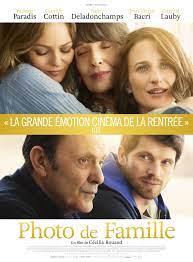
PHOTO DE FAMILLE/ FAMILY PHOTO
France, 2018, 98 minutes, Colour.
Vanessa Paradis, Camille Cottin, Pierre Deladonchamps, Jean-Pierre Bacri, Chantal Lauby, Laurent capelluto, Marc Ruchmann, Claudette Walker, Jean Aviat.
Directed by Cecilia Rouaud.
There are two family photos, one of siblings when they were young and on holidays, the second in their middle age, revisiting their holiday home, wanting a new portrait, but the camera delaying and their being caught in comic mode. So, a light touch. However, the film begins with a funeral of the grandfather and the family gathering. The film ends with the grandmother’s funeral. So the more sombre touch.
There are many generations in the family, starting with the grandfather who is buried at the opening of the film, and the grandmother who is suffering from senility, genial, not recognising people, prone to wandering. We are introduced to the grandmother, not recognising her son, a 60-year-old businessman who is separated from his psychiatrist wife long since, a womaniser in his past, neglecting his children. However, his ex-wife is devoted to her mother-in-law and cares for her. In the next generation are three siblings, Gabrielle, played by Vanessa Paradis, single mother, posing as a statue in the Paris streets for her work, with her teenage son whom she tends but who prefers to live with his absent father; Elsa, played by Camille Cotton, married to Tom, unable to have children, resentful of her mother’s psychiatrist treatment of her in the past, working to rehabilitate young people, angry; Mao, Pierre Deladonchamps, not speaking in his early childhood years, prone to depression, a genius with creating computer games.
The first issue challenging them is whether they will take care of their grandmother, the two women agreeing, some scenes of her presence (and wandering), Mao refusing but, when her son organises her into Aged Care, Mao paying. And the next generation is in Gabrielle’s son, angry with his grandparents, clashing with his mother. Mao has no children. Elsa cannot have children. And this causes alienation from her loving husband, Tom.
Which means there are some happy family sequences. There are many family disputes. There are some ironic sequences, especially as Mao goes for therapy with the psychologist, Elsa trying to break through with her mother. Gabrielle gets a job and selling the phone in the computer games factory but is inept, attracted towards Mao’s associate, Stephane, but cautious about the relationship.
As with this kind of film, through many domestic scenes, some meals, some frank talk, some attempts at reconciliation, and a more positive ending with the father admitting his inadequacies, comforted by his new younger partner being pregnant, mother and children with some understanding – and, with the death of the grandmother (and Claudette Walker is very attractive in this role), the siblings decide to return to where they were very happy in childhood, their holiday home, to take the family photo.
The film has a very feminine sensibility with the writer-director, Cecilia Rouud.
1. Family story, the range of generations, relationships, good and bad, harm, possibilities for reconciliation, the future?
2. The title, the photo of the siblings when young, the final photo and its hope?
3. French sensibilities, the writer-director and her female perspective? The importance of the focus on the women? The lesser focus on the men?
4. Paris settings, homes, schools, outings, workplaces, offices, Gabrielle and her statue, Elsa and her work for rehabilitation? Aged care homes? The musical score?
5. The introduction to Pierre, age, separated from his wife, his younger partner, her pregnancy, getting the meals for his mother? The funeral, her husband, and not knowing where she was, who her son was, genial, her comments, everybody caring for her? Her being brought by Claudine, Claudine bonding with her despite the separation from Pierre? The gathering afterwards, Mao and his seeming disregard, Elsa and her concern, Gabrielle and her son?
6. The grandmother, her not being with it, yet a certain charm? The family discussion about her care, Gabrielle willing to take her? Mao refusing? The various episodes with her in the house, Gabrielle and her son, her moving to Elsa, Tom and the difficulties with her, the discovery that Mao was paying for aged care? Pierre, his decisions, going to the aged care home, his reactions, the interviews, his demands? Her moving in, the visits, her wandering, the police bringing her home, at the railway station to buy the ticket? Her fall, hospital, the visits, Pierre and her lunch, urging her on? The issue of going to St Julien and the memories of the past? Her death, and the sadness of her funeral?
7. Pierre, his reputation long marriage, womanising, not caring for his children, his partnership with the young woman, her pregnancy, the interactions with his former wife? The different encounters with his children? Gabrielle asking him to talk with her son about his living with his father? His visits to his mother? The decision about Aged Care?
8. Claudine, psychiatrist, seeing her with clients, her listening to her children, Elsa and her harsh reaction, Mao and his not talking when he was young, the effect of his mother? Her intervening? The dinner with the leaks and Elsa meeting the client with the leaks? Her thinking that Elsa was pregnant and visiting her?
9. Gabrielle, her job standing as the statue, bringing up her son, his absent father, the son wanting to live with his father, the tensions at home, her care for him, at school, at home, helping her father clear out his house, taking in her grandmother, getting the job with the office, not answering the phone, her attitude towards Stephane, the kiss, the consequences, keeping her distance, the visit and meeting his brother and their comments? Drinking? Her allowing her son to go to his father? Shaking hands? The later hug? The son, his age, the experience of Gabriel’s mothering, his father, the audience never seeing him? His visiting his grandmother? Pierre and Mao both talking with him?
10. Elsa, angry, love for her husband, yet the tension, the issue of pregnancy, inability to have children, the consequences? Her work with the young men to be rehabilitated, digging, her harshness with them? Taking in her grandmother, Tom and his reaction, Tom eventually leaving despite loving her? Her interactions with Gabrielle? With Mao? The alienation from her father? Her mother thinking her pregnant and bringing the gift? Visiting her mother, the resentments, her mother acting as psychiatrist with her? Visiting her grandmother in hospital?
11. Mao, his story, not talking when he was young, the change, the holidays, love for his sisters, the photo? Growing up, depressed, reserved, yet his success with computer games, with Stephane, going to the psychiatrist, his sessions and revelations? Paying for his grandmother in aged care? Contemplating suicide? His walk along the river, falling down by accident, there all night, Stephane coming, then refusing to help, getting his sisters, Elsa and the young men drifting him out?
12. The death of the grandmother, the three siblings and their interactions, the reconciliations of the funeral, the decision to go to St Julien, changing the clothes, the toys, the past, the attempts at the photo, the comic touch with the final photo?
13. Possibilities for reconciliation, a better future?
Jonestown: Terror in the Jungle
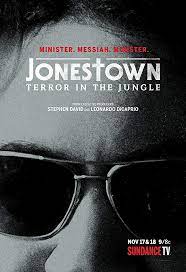
JONESTOWN: TERROR IN THE JUNGLE
US, 2018, 168 minutes, Colour.
As themselves: Vernon Gosney, Leslie Wagner-Wilson, Tim Carter, Jim Jones Jr, Stephan Jones, Jeff Guinn, Mary McCormick Maaga, Grace Stoen, Laura Johnston Kohl, Jackie Speier, Marshall Kilduff. As Jim Jones, Jason John Cicalese.
Directed by Shan Nicholson, Richard Lopez,
This is a powerful documentary screened on television in four episodes.
Memories of Jonestown a strong in the American memory and psyche, the mass suicide of over 900 people, men, women, children, drinking Cool Aid spiked with cyanide or being injected with cyanide. The scenes in the final episode, the buildup to the killings and the motivations, the horror of the deaths and dying, those not wanting to die, those wanting to escape Jonestown, the images of the massed bodies, close-ups of groups, aerial photos.
There have been many cult leaders, many cult communities, isolating themselves from the world, often with religious motivations, many adherents, the attraction and power of the cult leader. Jim Jones became the most notorious in American memory. In 2006 there was a 86 minute documentary screened about Jones and the events with testimonies from survivors. This present documentary uses the same method but has a wide range of survivors as well as authors and commentators. And, the survivors are being interviewed 40 years after the events with final indication of how they coped with their experiences and what they made of their lives.
Two of the most powerful commentators are survivors, Vernon Gosney who commands the screen as he tells his story, with flashbacks to footage of him when young, narrating his attempt to escape Jonestown, his being shot, his recovery, the discovery of what had happened and its effect on him. (In fact, he served 30 years as a police officer.) Also very strong is Tim Carter, again footage from the past, the death of his child, disillusionment with the situation, packing, escaping into the jungle, abandoning the suitcases, rescued. At times in the interview, generally speaking very calmly in describing his memories, on the point of breaking down with emotion. A mother who lost a large number of family and friends, surviving by escaping into the jungle with her son, is Leslie Wegner-Wilson. Also interviewed his Grace Stoen who left Jonestown much earlier, leaving her son and making every attempt to recover him but his being taken into special charged by Jones himself, and indications that Jones killed him during the suicides.
Two of Jones sons, in Jr and Stephan, late teens and early 20s in their time with their father, are also interviewed at length. They were absent in Georgetown at a sports event and tell their story of their being informed of what it happened, the woman with whom they were staying killing her children, the police, going to Jonestown itself. The two men made something of their lives and their families.
The first episode goes to the origin of the People’s Temple in San Francisco, Jones as a cult leader, drawing a great number of people to the Temple, both black and white, his talk of a better world, religious motivations. He then goes with his group to Guyana, setting up a town outside Georgetown, making it the home of the Peoples’ Temple, promising them a better life and seeming to achieve it. A great deal of footage of the enthusiasm of the people in Jonestown. However, over the years, Jones love of power emerges, his control over every aspect of the people’s lives. And, in his own life, there is sexual exploitation, dependence on drugs, his being photographed speaking, especially with his dark glasses.
Most people want to stay but there were some who left raising suspicions in California, in San Francisco, relatives in the US concerned. In November 1978, Congressman Leo Ryan along with an assistant, Jackie Speirs, and journalists flew in to Guyana, visited the town, met people, listened to stories, then went to the airport and were attacked by guards from the town, knives, guns, Leo Ryan killed, Jackie Speirs wounded in arm and leg, thinking she was dying. The repercussions for Jones was that authorities would come in and, over the years, he had suggested that if enemies came, it was better for the whole group to kill themselves, a revolutionary gesture against those who would destroy their town.
In the final episode, there are excerpts from the recording made of those events, eerie to listen to, eerie in visuals, with some reconstructions with actors.
(On a personal level, this reviewer was on sabbatical in Berkely in October-November 1978, very conscious, especially the media, newspapers, of what was happening in Jonestown, the background in the preceding years, the death of Congressman Ryan, the repercussions in San Francisco, and then the horror of what actually happened. This is still very strong in the memory.)
This documentary series is well worth seeing, harrowing, but an alert to the dangers, megalomania of cult leaders, and the dire consequences for their followers.
Criminal Activities
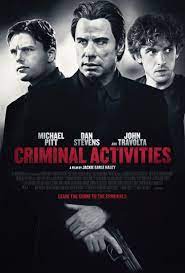
CRIMINAL ACTIVITIES
US, 2015, 94 minutes, Colour.
Michael Pitt, Dan Stevens, Christopher Abbott, Rob Brown, Edi Gethegi, Jackie Earle Haley, John Travolta.
Directed by Jackie Earle Haley.
There is some irony in the title. The four central characters could not be called criminals but they are drawn into the criminal world of abduction and, then, of murder. However, there is a range of urban gangsters, Italian background, African-American backgrounds – an investigation by FBI agents.
This is the only screenplay by writer, Robert Lowell. Which is a pity – because there is a lot of inventiveness in his screenplay here and quite some unexpected twists as well as some tongue-in-cheek humour.
The focus is on four men, early middle age, or at school together, one of them the subject of bullying. The film opens with the death of a friend, hit by a bus in the street, suspected suicide. The four meet after the funeral and there is a discussion about a financial proposition, proposed by Noah (British Dan Stevens) whom the other three rather disdain, memories of their bullying him at school. The leader of the group is Zach (Michael Pitt), a smug businessman, about to be married, a private investigator checking on the absences of his fiancee and becoming more and more paranoid about her whereabouts. More sympathetic are the other two members, Warren (Christopher Abbott) who has given up drinking. There is their African-American friend, the sympathetic Bryce (Rob Brown). Noah, in real estate, makes them a proposition so that they be partners in a business and he would supply the $200,000 needed.
One month later. Their business connection is arrested and the four go into panic. They are approached by a local boss, played with some complacency and charm by John Travolta. He gets involved in the kidnapping of the brother of an African-American gangster to be used in exchange because of the abduction of his niece. Needless to say, they go into panic. However, masks on, they do go to a restaurant where their target is talking with his criminal friends. They succeed, hold the hostage in a warehouse for 24 hours. This gives the film the opportunity to explore the character of each of the four men as well as the very streetsmart acumen of their hostage. Noah keeps putting his foot in it – but they do send him out to buy some ice cream. The hostage tries to bribe the others to let him free. And they wait for the phone call from the gangster.
The audience then learns much more about the situation, the role of the FBI agents, the tough African-American gangster leader who wants his nephew back, and the discovery that the hostage is wearing a wire. So, twists and complications. Zack panics but the gangster arrives and commands that each of them shoot the hostage.
Then the film goes three hours later and some revelations about the contrivances of the plot and who is being paid off.
Even more tantalisingly, the narrative goes back several months earlier explaining how of the whole exercise was a set up, and a revenge. Actually, quite a twist and an ending!
The film was directed by actor Jackie Earle Haley who plays the henchmen for John Travolta.
1. A different crime story? Participants? The mob and gangsters? Race issues? The FBI and undercover agents? Businessman out of the depths? Revenge story?
2. The American city, the initial death in the street, the bus? The funeral and the church? The businessmen meeting, the restaurant? The drama of the abduction? The warehouse, interiors, holding the hostage? The world of gangsters, jogging in the streets, meetings, the African-American gangsters? The musical score?
3. The title, the irony is in connection with the four men, professional gangsters?
4. The structure of the film, the death and the funeral, the meeting, one month later, the confrontation with Eddie and the consequences, moving to 3 hours later, and then the twist with moving to months earlier and the revelation of the twists?
5. The four men, the death under the bus, the suicide and depression, presence of the funeral, meeting, the memories of Noah, dislike of him, the three pretending to welcome him? Recalling school episodes and their treatment of Noah? His inheritance, issues of money, real estate, the advice, the plan, the money, partners?
6. The month later, the rest of the businessman, the threat to the fore, their reactions? Zach, assuming the leadership, business, his relationship with his girlfriend, paranoid about her behaviour? Warren, more sympathetic, quiet, giving up alcohol, listening? Bryce, African-American, sympathetic? Talk, the reaction to the loss of money? Eddie, the John Travolta screen persona?
7. Eddie, his background, his manner, quoting Macbeth, the story of his niece and the kidnapping, the planned to kidnap Marques, the hesitations of the men, trapped, deciding to do the abduction, the masks, Marques and his friends, the toilet, taking him, the violence, the shot, the van in pursuit overturning? The warehouse, tying him up?
8. Holding Marques for 24 hours, waiting for Eddie’s call, the different personalities being revealed, the interactions, Marques trying to persuade Noah with money, Bryce, the upset but Marques in the toilet? The various moods, Zach and the private investigator about his girlfriend, his anger, bashing Marques? The discovery of Marques and the wire? The shifting of mood, Marques and his friends in the restaurant, recording the conversations, the FBI in the van listening, the FBI hearing all that happened with Marques’ abduction, going to the African-American thugs to get information?
9. Eddie, the phone calls, Zach cutting him off, Zach and his plan to leave, Eddie arriving?
10. Eddie, the demand to kill Marques, the reluctance, Warren shooting him? The reaction of the others?
11. Three hours later, Noah and Eddie, the bag full of money?
12. The months earlier, the revelation about Noah, the flashbacks to his being bullied, his plan for revenge, confrontation with Zach, the discussions with Eddie, Eddie agreeing to the set up, the plan in operation, revelations about Noah when he went to buy the ice cream, continuing the deals, Zach and his paranoia about his girlfriend, seeing the photos, discovering the other man was Noah? No pushing the man under the bus?
13. The irony of the ending, Noah achieving all his ambitions and his revenge, and going off with the girlfriend, and the money?
Talk to Me
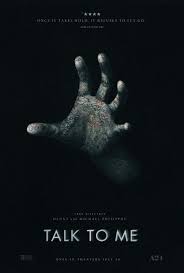
TALK TO ME
Australia, 2022, 95 minutes, Colour.
Sophie Wilde, Jayden Davison, Joe Bird, Miranda Otto, Otis Dhanji, Chris Alosio, Zoe Terakes, Marcus Johnson.
Directed by Danny Philippou, Michael Philippouo.
The invitation “Talk to me” sounds inoffensive enough, an invitation. However, it can be heard as abrupt and commanding. Here it is what a group of teens say when they gather for a party and begin what is a weird process.
However, this Australian, small-budget film begins with a moment of ordinariness, a young man coming to a party at home, looking for his brother who is troubled, suddenly stabbed and the brother killing himself. A jolt. Then the film moves towards the youngsters who are central to the film, at school, friends, bonding, going to parties. The central character is Mia, a commanding performance by Sophie Wilde, something of a loner in the group, her mother probably having killed herself, distant from her father, relying on her close friend Jayden (Jayden Davison) staying over at her home, friendly with her younger brother, Riley (Joe Bird) although under suspicion from the hard-working and sometimes tough mother, Sue (Miranda Otto).
As we wonder what the connection is with the dramatic prologue, we get to know some of the youngsters, Jayden rather restrained but joining in, Mia quiet but vivacious, two rather boisterous friends, Hayley and Joss who introduce to the group a mysterious hand that they have acquired – a ceramic hand, the suggestion of a real hand within, and writing and scrawl all over the ceramics. There is something of a craze going about, especially for thrill-seekers. Someone is dared to take hold of the hand, recite “talk to me” and then, more than a touch mesmerised, to say “let me in”. So, this is a possession-horror film, and, for a limited number of seconds, the hand-holder is possessed, thrust back, contorted, taken over. And, this being the 21st century, all the excited participants have their phones out filming everything. A ritual candles lit then has to be blown out and that is at the end of the possession.
Mia agrees to the experience – a frightening face, letting the person in, convulsed, the audience wondering whether this is a death experience, and then it is over, everybody laughing and excited. It seems as though this is going to become a craze with everybody wanting to try it out – with a touch of becoming addicted to the experience. (Obviously a parable parallel to drugs and other intoxicants.)
As expected, several of the people want to go through the experience, especially Daniel, who is close to both Mia and Jayden – and, for him, a hugely embarrassing, psyche-revealing experience of being possessed. But, Jayden’s younger brother, Riley also wants to have the experience, Mia encouraging him because she has been having experiences of her dead mother and wants to connect with her. The drama is in Riley taken over in this experience, Mia urging him, allowing him to go beyond the allotted time, his communicating something of her mother but the after-effects, the candle not blown out and so his being continually possessed, brutally bashing his head against the wall and taken to hospital for recovery. Further tensions between Mia and Jayden and her suspicious mother.
While it has some of the tropes from horror films, it does a disservice to Talk to Me to describe it as a horror film. It is better described as a possession drama and the consequences, combined with some issues of family relationships. The film builds up to conflict for Mia, her wanting to right the situation, for Riley to heal and stop the torment, her seeing visions of the strange and bizarre possessing souls, and a climax which will lead us to?.
(This is the first feature of twin brothers Danny and Michael Philippou who have spent 10 years creating video dramas for Youtube and gaining over 1 million followers – and selling this film for North American distribution for a price that more than paid for the film itself.)
1. The title, the various tones that it can use, tender, encouraging, demanding, threatening?
2. An Australian production, the work of the directors, the Youtube shorts and followers, first feature? The cast?
3. A possession film, touches of horror? Yet the family issues under the surface, within the family, the dead mother, the role of the father?
4. The opening, the party, Cole seeking his brother, the family, going into the room, Duckett, stabbing Cole, stabbing himself?
5. The focus on young people, late teenagers, school, bonding, parties, family backgrounds? The party sequences, music, drugs?
6. The focus on Mia, age, background, her dead mother, her relationship with her father? Her friendship with the family, Jayden as close friend, Riley, Sue and her suspicions? Friendship with Daniel? Outings, talk, staying over…?
7. The introduction to Hayley and Joss, parties, the introduction to the hand, ceramic, the writing on the hand? Touching the hand, something of a craze with the young people, the thrill, repetitions, touch of addiction to the experience? The strange experience, the high?
8. The process, the hand, holding the hand, saying “talk to me”, the effect on the person holding the hand, the touch of being mesmerised, seeing images and faces, saying “let me in”, the shock, falling back, possessed, the eerie experience, possession, the time limit?
9. Mia and her experience, the frightening face, the 90 seconds, the candle blown out as the ritual for ending the experience? The reaction of the youngsters, everybody with their phone, laughing, a thrill, the mystery? The aftermath? Mia and her talking with Jayden?
10. Daniel, his relationship with the two girls, his wanting to have the experience, the lascivious experience, kissing the dog, the aftermath and his reaction?
11. Their seeking out Cole, to ask him about the origins of the hand, the experience with Duckett?
12. Riley, his friend, age, daring each other? Riley coming to the session, wanting to experience after watching? His being allowed to experience it, Mia’s mother entering into him? The repercussions, for Mia, her anxiety, having encouraged Riley to experience it, wanting to contact her mother, extending the time, the candle not blown out? Riley and the experience, and his bashing his head, repeatedly, taken to hospital?
13. Mia, the experience of her mother, her mother’s appearing, the suicide, a mother encouraging her daughter, to ask her father, the contact with her father, the discussions, his concern, her being upset, staying with the other family, confronting her father, is reading the note from her mother, the encounters with her father, her being possessed, the scissors, killing her father?
14. The hospital, Sue, a hard mother, supervising the children, working, working back, not wanting Daniel in the house, suspecting Mia of taking drugs? The hostility in the hospital?
15. Mia, wanting to visit Riley, wanting to end the session, wanting to contact her mother? The phone call to Jayden, getting her out of the hospital, Jayden going to the house, discovering the dead father? Coming back to the hospital, the chase through the hospital? But Mia and the reconciliation with Sue?
16. Jayden, observing, distancing itself from the experience, concern about Riley? Mia’s phone call and going to the house, coming back to the hospital, the confrontation with Mia?
17. Mia, going to the water, Riley in the wheelchair, the possibility of putting him into the water, ending the situation? Her decision to go into the water herself? Riley and his feeling, reunited with Jayden and Sue?
18. The repetition, the new group, the hand, the invitation for Mia to enter into the possessed person?
Ping Pong Summer
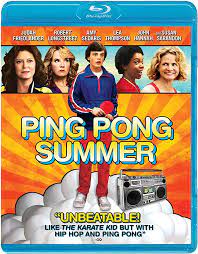
PING PONG SUMMER
US, 2014, 92 minutes, Colour.
Marcello Conte, Myles Massey, John Hannah, Lea Thompson, Susan Sarandon, Joseph McCaughtry, Andy Riddle, Judah Friedlander, Helena Seabrook, Emi Shockley.
Directed by Mike Tully.
Ping-Pong Summer is set in 1985 (and film buffs noting that is the year of come back to the Future and Lea Thompson as the star). It is also the era of John Hughes films.
On the whole, this is a very nice film, the target audience is early teenagers, the central character, Rad (Marcello Conte in a rare film performance), is 13, shy and awkward, loves ping-pong, hip-hop music. He befriends a young African-American boy, Teddy (Miles Massey) and they bond. However, they are targets of two older boys, bullies, mocking, winning a table tennis. Rad also encounters a young girl but is disappointed in her, thinking she takes cocaine, is drunk, is rather reprimanding of her but she confesses to him and changes.
The film has detail of family holidays on the Maryland coast and beaches. But, the drama as the title indicates focuses on ping-pong and Rad is able to be coached by former champion who lives next door – played by Susan Sarandon.
This is a rather low-key family film, especially for younger teenagers – and for their parents.
1. The tone of the title, the emphasis on ping-pong, the summer holiday? 1985?
2. The target audience, early teenagers in mid teenagers? Rad is 13, Teddy is 13, the older bully boys, the girls? A film for parents?
3. The family, getting ready for the holiday, the older sister with the touch of the Gothic, red shy, awkward, ping-pong, hip-hop? Travelling to the holiday, setting up the house? The musical score?
4. The focus on Rad, going out, the encounter with Teddy, Teddy and his outreach, friendly, African-American? Doing everything together, the table tennis, the music, friendship? The bully boys, their age, mocking, racist? The issue of ping-pong? Rad and his being defeated, the mockery?
5. The family, the mother and father, the relationship, concern, Michelle and her being aloof, concern about Rad? The meals out? Conversations, the ping-pong, the going to the match, support?
6. The bullies, verbal, physical, the sport? The leader, his subservient friend? Winning at ping-pong?
7. Rad, seeing Stacy, the conversations, the attraction, her drinking, his thinking she took cocaine, his disappointment in her, the later talk, her confession, change, support?
8. The ping-pong, the neighbour, a champion, played by Susan Sarandon, the training, the concentration, her coming to the match? The dramatics of the game, Rad down, coming back, the arrogant assumptions of the bully, the high melodramatics of the final shot!
9. Not exactly a coming-of-age film but a 13-year-old on the way.
Outback/ 2019
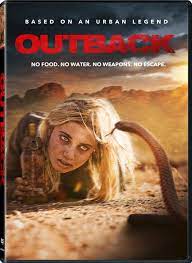
OUTBACK
Australia, 2019, 86 minutes, Colour.
Lauren Lofberg, Taylor Weise, Brendan Donoghue.
Directed by Mike Green.
It is a pity not to be able to support the first feature film of an aspiring filmmaker. While the photography is fine, the plot has touches of the absurd, the characters very difficult to like or empathise with.
The film opens at Sydney airport with a couple of arriving from the United States, he having proposed but, at the airport, quite some tension between the two. And this continues throughout the film, making audiences wonder why they were together, what brought them together, what they have in common, the disturbing tension between them. They hire a car, look at a map, decide to drive to the beach where he is reluctant to have a swimming, then relents seemingly over cheerfully, is bitten by jellyfish which has some dire consequences.
They decide to go to Guru, the screenplay giving information that seems that it is far closer to the East Coast of Australia and actually is. Off they go, relying on the GPS which then deceives them and takes them into all kinds of back roads. And, while their behaviour has been somewhat stupid so far and their clashes and their treatment of the man’s jellyfish sting, what they do next is, as some of the bloggers say, “idiotic”. In polite terms one might say they show no common sense, wandering out into the outback, losing their sense of direction, not knowing how to get back to the car, he going out to search, returning while the young woman is bitten by a scorpion and goes into a kind of coma.
There are unpreparedness for this visit to the outback is appalling.
The film runs for only 86 minutes, is rather prep repetitive, he wandering round and searching, eventually finding the car, but dying. She revives, wanders, trying to eat some berries, thirsty, finding the car and her boyfriend dead. She finds the ring. She has the camera and has taken a great deal of footage, thinks about her mother, a kind of farewell – until she is found in saved.
Allegedly based on fact, even at the beginning using the word “legend” which dignify is the proceedings extraordinarily. Overall, a disappointment in Australian filmmaking – and not very flattering to naive Americans coming to visit.
Sisu
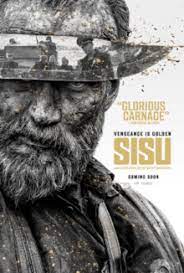
SISU
Finland, 2022, 91 minutes, Colour.
Jorma Tommila, Aksel Hennie, Jack Doolan,Mimosa Willamo.
Directed by Jalmari Helander.
Pretty graphic. Sorry, not very pretty graphic. Often ugly and brutal. For those whose sensitivities do not relate to graphic, give Sisu a miss. (And Sisu, we are told, is a Finnish word that cannot be translated, indicating absolutely strong determination of will.).
Opening information tells us we are in Finland, 1944, in the land of the Sami in the North, what we have called Lapland. The Nazis are retreating into Norway. The Soviet Union has a treaty with Finland to disarm the Nazis.
So, a World War II movie – but not in the traditional vein. Rather, most of the time is in the open plains, then forests, and finally a bombed city. Sisu, in fact, plays very much like a frontier Western or, more exactly, a spaghetti Western. A boding, booming score with more than a touch of composer Ennio Morricone instruments, sounds, male chorus in 21st-century style. The central character, a kind of Man with No Name whose name is mentioned by the Germans, is a loner prospector, a wandering, and grizzled old man with no money, and, just as it seemed right to call him the Man with No Words, in the last moments he utters two sentences!
Knowing that the trailer for Sisu showed some gory violence, gashes and wounds, lots of pain, a flying limb or two, it was surprising to read the review by veteran reviewer, Sandra Hall, who called Sisu a guilty pleasure. And it is, the violence with more than a touch of the cartoonish, our finding ourselves suddenly compelled to burst out laughing at what is grim stuff, but it is very much in the vein of explicit graphic novels, no holds barred. We laugh at the sudden, unexpected violence as if this is the writer-director was making a war comedy.
Our silent hero is seen gold-prospecting – and he discovers a huge vein. Then come the fleeing Nazis, some 23 sneering, most mocking, and later some cowardice. There are chapters, especially the third in a minefield, mighty explosions, in our hero, one against 20, truck, bike, tank. They find out who the silent man is, a veteran commando, loss of wife and children, best in commando show, called “immortal”. But, as one of the trafficked women in the truck says, he is not immortal, he just refuses to die.
And he is given plenty of opportunity is not to die, shot, stabbed, fistfights, drowning, even hanged. The plot becomes more and more impossible, especially the finale in a crashing plane and (spoiler alert for those who enjoyed Dr Strangelove) and explosive finale.
Neo-Nazis beware – you will see your ideological predecessors humiliated and beaten (and they are certainly not nice people).
Sandra Hall says Sisu is perversely entertaining. In summary, a macabre hoot.
Bird Box: Barcelona
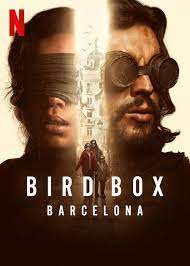
BIRD BOX: BARCELONA
Spain, 2023, 112 minutes, Colour.
Mario Caas, Georgina Campbell, Naila Schuberth, Alejandra Howard, Leonardo Sbaraglia, Diego Calvia, Patrick Criado, Lola Duenas, Gonzalo de Castro, Michelle Jenner.
Directed by David Pastor, Alex Pastor.
The 2014 novel, Bird Box, written by Josh Malerman was filmed in 2018 with Sandra Bullock leading a strong star cast. Produced by Netflix, it was one of its major successes. Five years later comes this variation on the novel, directed and written by the Pastor brothers, with the novelist and Suzanne Bier, director of the original, acting as producers. It is a Spanish production but has Spanish and English, with some German, dialogue. It is set in Barcelona, striking images of empty streets, dust and debris blowing in the wind, piles of crashed vehicles.
The premise of this apocalyptic story is that some entities have come to earth, mysterious, destructive, causing widespread panic all over the world, blindness to millions of people, and a compulsion to graphic suicides. Survivors have to put on dark glasses and blindfolds not to be infected. The only hope is to reach the castle above Barcelona where the survivors have set up laboratories to try to find some kind of antidote to this plague.
The film is very striking in its action sequences and energy drama. It begins puzzlingly, a father and daughter walking the streets, encountering straggling files of the blind, the father ingratiating himself with a group, their tending to him, and then his driving a bus out of the dark factory onto the roads, crashing, their being killed, images of light seen ascending towards the sky. The father, played by Spanish star, Mario Casas (often seen in Spanish thrillers and historical films) has a strong bond with his daughter, Anna (Alejandra Howard). We are mystified. What of the explanations of the father and daughter? The plague?
Interspersed throughout the narrative are several flashbacks to the months before the opening events, building up some explanation of what has happened. In the first flashback, nine months earlier, there are some spectacular sequences of the impact of the plague, the graphic suicides and blindness, the father, in the streets, in the underground, crowds and panic. And, his wife is killed by an out-of-control car.
Gradually the mystery develops, the father, Sebastian, able to see without glasses, not blinded, continuing to ingratiate himself, this time with a sympathetic group, led by psychiatrist, Clare (Georgina Campbell), looking after a young German girl who has lost her mother, Sofia, some young professional men and an elderly couple. More flashbacks to some months earlier, especially Sebastien and his daughter going to a church, the encounter with a strange priest who is caught up in a heavenly interpretation of the plague, eager to see God and draw others to this vision. Later, the priest will appear in deadly confrontations with Sebastien.
But, in the interaction with Claire and Sophia, Sebastien who is now named as one of the special people affected by the invading entity who is not blinded but is given strange powers of site, “Seers”. Part of his vision is of his daughter, reappearing, urging her father to kill everyone so that they can be saved. Ultimately, there are some dramatics and melodramatics with Sofia and Claire, Sebastien’s change of heart, his helping them, and a final confrontation with the priest.
The film ends in the Castle, the military, the survivors, the laboratories, and the anticipation that the scientist will find some kind of antidote to haul this dramatic apocalyptic.
The basic tale transfers effectively to the city of Barcelona.
1. The original novel? Apocalyptic? The 2018 version? American? Popularity? The Spanish adaptation, the core of the original novel, Spanish perspectives?
2. The premise of the story, the invasion of alien entities, destructive, the manifestations, birds flapping wings, leaves and debris in the street rising, the panic amongst the population, blindness, suicides, the media commentaries and warnings, the mass destruction and deserted streets, survivors binding their eyes, in darkened buildings, no windows? The message to get to the Castle for safety?
3. The visuals, the city of Barcelona and its landmarks, the streets, the water, buildings? The underground? The destruction, abandoned streets, litter in the streets, the piles of crashes? Ultimately the tower, the cable cars, the Castle and safety? The musical score?
4. The structure of the film, the events, the focus on Sebastien and Anna and their activities, the mystery, origins? The flashbacks, nine months earlier, Sebastien as an engineer, news of the suicides on site, rushing back to the city, the visuals of panic, the underground station on the trains, the cars crashing on the streets, Sebastien, the phone calls to his wife, risking his daughter from school, his wife crossing the street, the planned escape, her being killed by the runaway car? And his death?
5. The present, Sebastien, his appearance, Anna with him, the abandoned city, seeing the group, his tagging along, his being bashed by the thieves, his being tended to, the group of survivors, sleeping in the bus, his getting the keys, driving the bus, through the streets, the crash, the puzzle of the survivors, blindness, deaths? Supported by Anna?
6. The further flashbacks, and Anna and Sebastien, the encounter with the priest, the church, his fanaticism, religious language?
7. Sebastian continuing in the present, the next group, clear, English-speaking, psychiatrist, and memories of the death of her brother and hearing his voice, Sofia, German, separated from her mother, the elderly couple, memories of the past, reconciliation and love, the young men, the background, Octavio and his explanation using physics to explain the entities? Rafa, his death? Sebastien, urged on by Anna, his giving his daughters emblem to Sofia, his change of heart, the death of the men, the elderly couple, rescuing Sofia and Clare, taking them out, the car, taking them to the entry to get the cable car, the climbing the tower?
8. Anna, confronting her father, his being identified as a “seer”, his mission to save as many possible, ultimately encountering the priest, the conversation about wolves in sheep’s clothing, the fanaticism of the priest and his associates, echoes of cult leaders and power, Sebastien and his fight with the priest, each killing the other? Anna and her condemnation of her father?
9. Clare and Sofia, climbing the tower, the cable cars, judging when to jump, their travelling to safety, the soldiers, Sofia’s mother, the scientists, the experiment, DNA and the hope for an antidote?
10. An urban story of horror and apocalyptic?
Godland
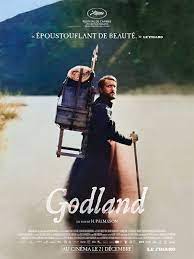
GODLAND
Iceland, 2022, 143 minutes, Colour.
Elliot Cross Hove, ingvar Sigurdsson, Vic Carmen Sonne, Jacob Lohmann, Hilmar Gudjonsson, Ida Mekkin Hlynsdottir.
Directed by Hlynur Palmason.
Even the title, Godland, has a strange sound about it. Commentators have noted that this is not an accurate translation from the Danish or the Icelandic. Rather it should be something like God-forsaken land, wretched land… And, in many ways, indeed it is.
There is very little joy to be seen in Scandinavian films. Almost no joy here. This is a sombre and bleak story, a 19th-century setting, and the highlighting of the colonial attitudes of Denmark towards Iceland and its inhabitants, differences in language, and willingness to learn languages, the difference between strong local Viking traditions and the more sophisticated culture of 19th-century Scandinavia.
And, as the title would indicate, this is a film about religion. The central character, the young priest, Lucas, is Lutheran, is seen conversing with the older priest (chomping away enjoying his lunch) sending Lucas on mission to Iceland, to build a church in a village before the winter. Lucas sits upright listening to the priest, his body language very serious, his face somewhat stern, sometimes expressionless even though so much is going on in his interior life. Lucas says the right words, is pious and earnest but, as is revealed, not particularly devout, not exactly having what we might call a spirituality.
Photography is important in this film, 19th-century experiments, the young priest with a large camera, plates, metals, stopping every now and then to get people to pose, hold the pose, capture the photographs. (The film does start with information that a box of photos was found in Iceland and that this film was based on this – except that this is a fiction, expressed by the writer-director, to have the priest photographer and photographed characters and locations.)
This is a film of great visual beauty, extraordinary photography of extraordinary landscapes, the sea, the remote beaches, cliffs, mountain peaks, valleys, plateaus and plains, streams and rivers, beautiful but harsh, challenging to any human trekking through these landscapes. Lucas has decided to go by land to the village, the many days, difficult journey, by horse and walking, Lucas unused to these landscapes, sometimes collapsing, feeling alienated from his Icelandic guide’s, especially the rugged Ragnar, fiercely Icelandic and patriotic. The tension between the two carries through the film, but some wonderful moments when Ragnar actually wants to talk to Lucas about life, about God and the experience of God, Lucas tending to dismiss him, using the excuse of not understanding his language. And, finally, there is a fine, religious sequence where Ragnar wants his photo taken, makes a confession of his life which suddenly leads to a violent confrontation between the two, fatal.
It is more than something of a surprise to find, when the group, along with us the audience who have shared the rigours of the journey, find a well-stocked town on the coast where the church is to be built.
The latter part of the film shows Lucas adapting (and not adapting) to life in the town, refusing to marry a couple outside the church building which is not complete, indicating his inability to adapt and understand. And, as might be expected, there is a God-forsaken, sombre ending.
1. A Scandinavian story, sombre and bleak? Characters in isolation? Landscapes? 19th century, colonial clashes between Iceland and Denmark? Different languages?
2. The title, the suggestion rather of God-forsaken Land? The title in Danish? In Icelandic?
3. The beauty of the photography, in Denmark and the church, the ship on the sea, the travel overland, the plains, plateaus, valleys, mountains and peaks, rivers, rugged, forbidding, beautiful? The musical score?
4. The premise about the box of photos, a fiction for the film, 19th-century photography, the priest and the large camera, the glass and plates, preparations for the photos, the poses, being still? The range of photos taken throughout the film? Some of the sequences produced and edited like photos?
5. The theme of 19th-century missionaries, Lutheran tradition, Iceland as a colony? The old priest, enjoying his meal, commissioning Lucas, the discussions, his warning to understand the inhabitants? His posing for the photo portrait?
6. The introduction to Lucas, stern, serious, earnest? Young? Inexperienced? Listening attentively, receiving the mission? The camera? On the ship, photographing the crew, the role of the translator? On the boat, rowing to the shore, landing in the water, the beach, carrying the camera, the carrying of the luggage, his collapse? Meeting Ragnar? The work of the translator?
7. Lucas, his character, pious but not necessarily devout, earnest and committed? Danish superiority to Iceland? Not learning the language? Wilful, wanting to travel overland – and the later revelation that he could have sailed close to the settlement?
8. The visuals of the journey, the time taken, the horses, camping intense, bathing in the rivers, talk, Ragnar and his songs, the story of the wife and the men abusing her, the need for translation? Climbing the mountains, the dangers, Lucas falling? The translator, singing, his fall, later the body seen with water lapping? Lucas’s final collapse, his being carried to the village?
9. Audience sympathies? Lucas and his personality, not attractive or engaging? Religious righteousness? Sense of mission? Ragnar, Icelandic, rugged, experience, his talk, how likable? The translator more genial? The other members of the trek, the young man, the woman, photographs?
10. The town, the Danish population, Icelandic population? Near the sea, the comforts of the house, the wood for the church? The building of the Church? Lucas, with Carl and his family, the daughters, the meal? Accommodation in the separate hut, Carl protecting his daughters? Lucas, wearing his religious garb, the scene of him and washing, naked, his humanity? The friendship with Ida, the conversations, the horse, friendly? The encounters with Anna, discussions, the horses, the attraction, people asking whether they would marry, the brief sexual scene and the focus on Anna, cutting away? Carl, his attitudes towards Lucas, hostile?
11. Life in the town, summer and autumn, no nights, ordinary home sequences, neighbours, farm work, labouring, the horses? The wedding and Lucas refusing to marry the couple outside the church building?
12. The completion of the church? Lucas and Anna? The horse riding (and Ragnar training Lucas to ride during the trek)? The future?
13. Ragnar, tough, dislike of the Danish, limits of language, the translators, Ida being half Danish and half Icelandic and her translations? Ragnar, working on the building? The conversation with Lucas about God, and being good? Lucas and his disdain? Ragnar wanting a photo of himself, the conversation with Lucas, with his camera, the powerful sequence of his confession, the killing of the horse, Lucas’s rage, the attack on Ragnar, the rock, Ragnar’s death? The background of the dog during the trek, lively and playful, then outside the church barking?
14. Everybody going to church, Lucas in his garb, the barking outside, Lucas and his praying, the devout words, his leaving the church, the dog, getting the horse, riding away after falling in the mud? The congregation in the church, the effect of the baby crying all the time? Carl, coming out, getting the horse, pursuing Lucas, his motivation for killing him? Lucas dead, the snow, the dead horse, the later discovery?
15. The clash between Christianity and pagan traditions? Embodied by Carl? Yet Ragnar and his asking questions? The two daughters?
16. The variety of style in the photography and its effect on the audience, the traditional box style, sweeping camera motions, inserted clips, especially the dead horses, photos? Portraits, close-ups and extreme close-ups? Involving the audience for 2 ½ hours?